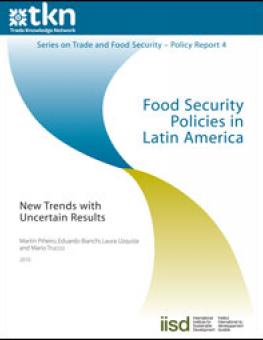
Food Security Policies in Latin America: New trends with uncertain results
The concept of food security has received considerable international attention since the World Food Summit organized by FAO in 1996, and even more so after the food crisis of 2007-2008.
The food crisis in Latin America had three significant effects in public policy related to food security: a) most governments in the region gave new and stronger attention to policies that attempted to protect vulnerable social sectors from the negative effects of higher food prices; b) it generated, at national and regional levels, new attention on the concept of food security and other related, but different, concepts, especially food sovereignty; and c) at national levels in a number of countries, it resulted in legislative actions that saw new laws that explicitly include the concept of food security and provide the government with more instruments for public intervention on the matter. In a few cases, the laws also create complex institutional mechanisms for social consultation and participation.
This report describes and analyzes these three areas of public policy responses, traces some of the outcomes that resulted from those public interventions and makes some recommendations in relation to the need for a balanced approach that provides appropriate attention to long-term policies. Section 2 deals with the food crisis and the main policy responses. Section 3 describes the major elements of the conceptual discussion on food security, the legislative actions taken in a number of countries and identifies the main types of public interventions that focus on food insecurity and hunger alleviation. Finally, Section 4 presents some suggestions in regards to what may be the needed and/or most appropriate policies
Key Points:
Policy responses in Latin America have not been country-specific. Most countries responded with a similar package of policies regardless of its agricultural natural resources endowment, trade situation in relation to its position as net food exporter or net food importer, or their importing capacity.
Policy responses concentrated in short-term policies attempted to decrease the price of food. However, most countries, notably Brazil and Mexico, also implemented programs that provide direct transfers of income or food to poor people.
Policy responses tended to increase trade barriers and consequently do not seem to have resulted in more regional trade.
In spite of the very active intergovernmental discussions and declarations, there is little evidence that regional cooperation and mutual support has increased.
Key Recommendations
The most likely scenario for food prices is that they will remain at a higher level than what they where before the food crisis and that they will tend to increase further once the global recession comes to an end. High food prices and their relationship to food insecurity remains a major policy issue that countries need to be prepared to respond to.
A main challenge is to define a set of interventions that have an appropriate balance among cautious macroeconomic polices, effective compensatory social policies and programs, and a lasting and effective supply-side stimulus for agricultural production and diversification.
One major element of these balanced policies is a properly thought-out commercial policy that provides an adequate balance between local production and imports in order to ensure the necessary food supply at a reasonable price.
Compensatory social policies and programs address one—probably the most important—dimension of the problem. In order to be effective, they require detailed information on the social sectors to be protected and a substantive implementing capacity on the part of public institutions. Most of the countries in the region do not meet these conditions and should make a substantive effort in institutional strengthening.
Latin America and a significant number of countries in the region, taken individually, are net food exporters. The food crisis is, among other things, an opportunity. Taking advantage of this opportunity requires long-term policies and substantial investments in innovation, natural resource development and conservation, and effective agrarian structures.
Food security is a major world issue. Consequently, there is a need for a new "Agricultural Deal" at the global level that promotes fair trade rules, increases food aid, contributes to lower price volatility in the international market and facilitates more investment in agriculture.
You might also be interested in
CSDDD: EU's Due diligence law vote should drive supply chain sustainability efforts
The European Parliament has voted to adopt the Corporate Sustainability Due Diligence Directive, aiming to address the environmental and social impacts of the supply chains of Europe's large corporations.
Ecuador Referendum Rules Out ISDS Return, Underlining Public Support for a Sustainable Path
Ecuador has voted to allow international arbitration and investor–state dispute settlement (ISDS) in its treaties and agreements. But the risks that initially made them turn away from this outdated model remain.
Brochure: IISD’s Sustainable Investment Advisory Services
IISD's Sustainable Investment team provides customized training, workshops, and advice to developing countries across the world.
Can China Contribute to Climate Action in Latin America?
Sisi Tang discusses three climate action initiatives between China and Latin America: a crediting mechanism for clean energy, debt-for-climate swaps, and a greener free trade agreement.